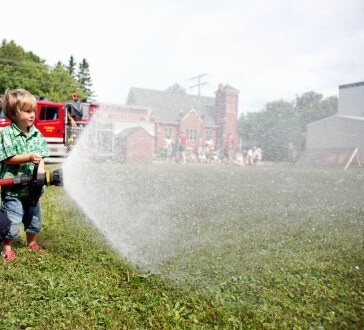
Organize Work Place Tours

Organize Work Place Tours
Have local businesses and town departments showcase what they do by organizing a workplace tour. Bakeries, farms, fire stations, and startups are all great places for children to learn what goes on in town while they are at school, and will show them the many different paths their careers can take. Plus, the businesses will love showing off what they do to a bunch of eager kids!
Have a Career Day

Have a Career Day
Alternatively, ask the businesses to come to you. Organize a yearly career fair with a number of local businesses, and allow the students to wander around, ask questions, and see what appeals to them.
Volunteer Reading Programs

Volunteer Reading Programs
Ask community members who want to be involved in the school, but might not have kids in the system, to volunteer to come in to read with students with lower reading levels.
This is a great opportunity for citizens to get to know the students, and allows struggling students to benefit from the extra reading practice while getting to know local townspeople as well.
Interview Local Community Members

Interview Local Community Members
Help your child interview local community members as a social studies project. It can be a war veteran, elderly person, or anyone else that has an interesting story to tell. It’s a great way to highlight local heroes and get students to interact with others. Plus, it’s always fascinating to hear others’ life stories!
Attend Community Events

Attend Community Events
Don’t wait for the community to come to you — get out there and make the needs of your child’s school known throughout the community. Attend town events like book clubs, church meetings, and town hall meetings. This brings school conversation to the citizens, and keeps them up-to-date on what is going on in the system.
Organize Summer Learning Activities

Organize Summer Learning Activities
Prevent summer “brain drain” and help kids stay out of trouble by establishing community summer learning programs with your local parks and recreation committee, library, and museums. This can include a community book group at the library, volunteer lectures at museums, and sports programs at the local parks. This is particularly great for low-income students, who might not have the opportunity to participate in local programs otherwise.
Be Active on Social Media Sites

Be Active on Social Media Sites
Read the newspaper and community blogs, and become active on social media outlets like Facebook, Twitter, and local forums. Interact with other town members by generating interest in local initiatives, participating in community events, and posting about school news. The Internet is one of the easiest ways to stay in the loop (not to mention — it’s free), so take advantage!
Arrange Face-to-Face Interaction

Arrange Face-to-Face Interaction
While social media is a great way to stay connected, face-to-face interaction is even better. Schedule regular breakfasts, coffee hours, or potlucks and invite local organizations to attend. Use these get-togethers as an opportunity to talk about school initiatives, accomplishments, and goals.
Encourage Use of School Facilities

Encourage Use of School Facilities
The school building sits empty at the end of the school day, and on weekends and vacations. Seek permission from the school to open its doors to local non-profit groups and community activities. Not only will it make good use of the school’s resources, but it will provide opportunities to get involved in community projects.
Organize Special Programs for Star Students

Organize Special Programs for Star Students
Approach local businesses to initiate rewards programs for students with good grades and attendance records. Suggest that businesses offer discounts or free services and products. It’s a great way for the town to encourage students to do well in school, and it allows local businesses to interact with their student population.





